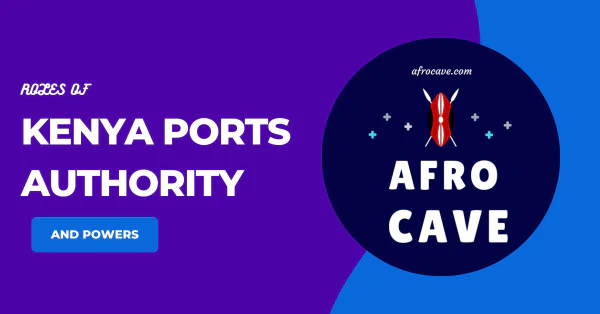Role and Powers of the Kenya Ports Authority
- Author Gĩthĩnji
- Updated on:

The role of the Kenya Ports Authority is to manage and operate the Port of Mombasa and all scheduled seaports along Kenya’s coastline that include Lamu, Malindi, Kilifi, Mtwapa, Kiunga, Shimoni, Funzi and Vanga.
In addition, the Authority manages Inland Waterways and Inland Container Depots at Embakasi, Eldoret and Kisumu. The Kenya Ports Authority Act establishes the Kenya Ports Authority.
The Authority shall be a body corporate with perpetual succession and a common seal. It shall have the power to sue and be sued in its corporate name and acquire, hold and dispose of movable and immovable property for the Authority.
The headquarters of the Kenya Ports Authority shall be at Mombasa.
Table of ContentsShow/Hide
Powers of the Kenya Ports Authority
As a statutory body, The powers of the Kenya Ports Authority are–
- to maintain, operate, improve and regulate the ports set out in the Second Schedule of the Kenya Ports Authority Act;
- to construct, operate and maintain beacons and other navigational aids;
- to construct new ports;
- to carry on the business of stevedore (loading or unloading of ships.), wharfinger (own or manage wharfs) or lighterman (operate lighters or barges);
- acting as warehousemen and storing items, whether or not they have been or will be handled as cargo or conveyed by the Authority;
- to serve as transporters of goods or passengers by land or sea, to the extent determined by the Minister (in charge of matters relating to the port);
- to consign goods on behalf of other persons to any places whether within Kenya or elsewhere;
- to provide such amenities or facilities for persons making use of the services performed or the facilities provided by the Authority as may appear to the Board necessary or desirable.
Subject to the Kenya Ports Authority Act, the powers listed above shall include all those that are necessary, advantageous, or proper for the Authority, and in particular, without limiting the generality of the foregoing, shall include the power–
- to construct any wharf, pier, landing stage, road, bridge, building or any other necessary or desirable works required for the Authority;
- to clean, deepen, improve, or change any port or its approaches;
- to provide and use, within ports and elsewhere, ships–
- for the towage, protection, or salvage of life or property;
- for the carriage of goods and passengers;
- to appoint, license and manage pilots;
- to regulate the construction and use of wharves in any port or its approaches;
- to operate trains and road transport;
- to conduct any business for the Authority that is required or desirable, and to act as an agent for the Government in the performance of any agreed-upon functions;
- to acquire, construct, manufacture, maintain, or repair any waterworks or electric generating plant or any other works, plant or apparatus necessary or desirable for the supply or transmission of water or electric energy to any person;
- to determine, impose, and levy rates, fares, charges, dues, or fees for any service performed by the Authority or for the use of its facilities by any person, or to grant a licence, permit, or certificate to any person;
- to prohibit, control or regulate–
- the use by any person of the services performed, or the facilities provided, by the Authority; or
- the presence of any person, ship, vehicle, or goods within any port or on any Authority-occupied premises;
- to sell, let, or otherwise dispose of any property, movable or immovable, that the Board believes is unnecessary for the Authority:
Provided, however, that the Authority shall not sell, let, or otherwise dispose of any building or land placed at its disposal by the Government unless with the consent of, and by, the Government; - to provide houses and other accommodation for employees;
- to act as an agent for any person engaged in the performance of services or the provision of facilities similar or complementary to those performed or provided by the Authority, whether in Kenya or elsewhere;
- to enter into agreements with any person–
- for the supply, construction, manufacture, maintenance or repair by that person of any property, movable or immovable, necessary or desirable for the Authority;
- for the performance or provision by that individual of any services or facilities that the Authority may perform or furnish;
- for the payment, collection, or apportionment of any fares, rates, charges, or other receipts arising out of the performance or provision by that person of any such services or facilities, and to finance or assist in funding the activities of the person, whether through a loan, the holding of stocks, shares, or securities, the guaranteeing of interest, or the retention of any stocks, shares or securities or otherwise;
- to agree with any person carrying on business as a carrier of passengers or goods, whether within Kenya or elsewhere, providing for the carriage of passengers or goods by or on behalf of the Authority and of that person under one contract or at a through fare or rate;
- to hold shares in any corporation and to establish or acquire any subsidiary corporation; and
- to enter into any arrangement with the Kenya Railways Corporation which, in the opinion of the Board, will promote or secure the provision, or improved provision, of any service or facilities which they may separately provide and without prejudice to the generality thereof any such arrangement or agreement may include provisions relating–
- to the use by either party of the facilities or equipment maintained by the other;
- to the temporary employment of staff of one party by the other on secondment or otherwise;
- to the charges made in respect of the use of any service or facility to which the arrangement or agreement relates;
- to the financing of any project by either or both parties;
- to conduct research relating to any current service or facility supplied by either party, as well as any service or facility under consideration; and
- to the joinder in the arrangement or agreement by any other person.
The powers apply only to the capacity of the Authority as a statutory authority and do not authorise the Authority to disregard any law.
For more information about the Kenya Ports Authority, see the Kenya Ports Authority Act or visit their website.
- «Previous Role of Agriculture and Food Authority in Kenya
- Next» Types of Parliamentary Elections in Kenya


